Two lifeboats, 62 men, 700 miles from nearest shore

27 August 1942. No SOS was sent. The impact of the torpedo destroyed the radio antenna and the emergency transmitter in the lifeboat does nothing. The 62 men are completely on their own in two overcrowded lifeboats.
Compass from one of the lifeboats of Abbekerk. Taken from the lifeboat by Lt Tuckett, Asdic operator on HMS Wallflower (Thanks to Aidan Tuckett)
It turned out we were in the middle of the north Atlantic Ocean. As far from New Foundland as from the Azores and from Ireland. Due to the most dominant westerly winds, it was decided to head for Ireland. We were enormously lucky so far because it was a very calm sea and a moderate southwest wind. We set sail for Ireland, 700 miles ahead.
Third mate Jacob Visser
The second mate estimates that it will take them at least a month to reach Ireland. The supplies on board are sufficient. But because of the destruction of two lifeboats during the attack the remaining two are now overcrowded at only 8 meters long and 2,5 wide. As long as the weather stays calm they are reasonably seaworthy but all of the crew know that they don’t stand a chance if the weather turns. And the North Atlantic is not known for its calm waters.
The weather was good and not cold. My seasickness did not prevent me from having a good look around the boat. We were packed in like herrings in a barrel. Falling over was not possible no matter how bad the weather would ever become. The mood was also good, thanks mainly to the fact that we were alive and no longer had the fear of being torpedoed. Now we could relax both in body and mind.
Assistent engineer Adriaan Kik
Since we initially went a little faster than the other boat we connected the boats with two long lines. Underneath the sprayhood, the oars were lined up with the blades, thus creating a sleeping space for six people. That meant everyone could sleep for two hours every day.
Third mate Jacob Visser
Abbekerk’s lifeboats sailing for Ireland.
(Picture taken from HMS Wallflower by radio operator Terry)When nature called we just had to sit on the gunwale and let it drop into the Atlantic Ocean. Very fresh with plenty of room. At first everyone glanced politely away as it was somewhat embarrassing but we got used to it fairly quickly.
Twice a day there was something to eat and drink. It was always the same: two solid ships biscuits ( about 5 mm thick and 6cm square) with a slice of corned beef (fresh off the knife from a just opened tin) in between. All this washed down with ten cubic centimeters of water which was needed considering the dryness of the biscuits.
The weather was ideal but the nights were fresh and long. Our bottoms started to become noticeably painful from sitting on those hard seats which appeared to become harder and harder. A large yellow flag was hoisted in the mast to attract attention. Three days and three nights passed without us seeing anything on the horizon.
Assistent engineer Adriaan Kik

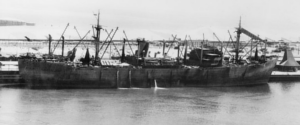
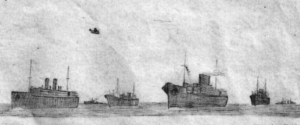
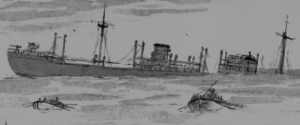
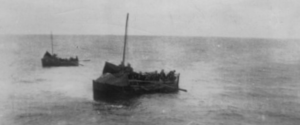
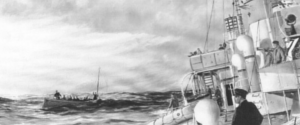
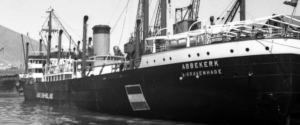





Wat een goedgeschreven verhaal. Er gaat een hele wereld voor de lezer open. Zo ver overal vandaan…